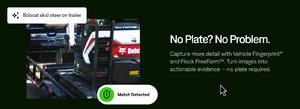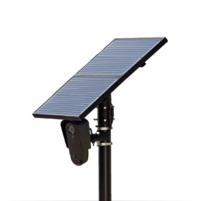Flock License Plate Readers
| Basic Information | |
|---|---|
| Release Year | 2017 |
| Product Type | Cameras, Security, Surveillance |
| In Production | Yes |
| Official Website | https://www.flocksafety.com/products/license-plate-readers |
Flock License Plate Readers (previously known as Flock Safety Falcon[1]), are a network of AI-powered surveillance cameras that record vehicle data for law enforcement agencies. The system operates in over 5,000 communities across 49 U.S. states, performing over 20 billion vehicle scans monthly.[2]
Taxpayer impact summary
Freedom
Residents and taxpayers have no mechanism to opt out of Flock's surveillance network. The cameras operate 24/7 in public spaces, recording all passing vehicles regardless of consent. Unlike traditional security cameras that may be avoided by choosing different routes, Flock's expanding network of over 40,000 cameras makes avoidance increasingly difficult.[3] The system uses AI to create "Vehicle Fingerprints" that identify vehicles by characteristics beyond license plates, including make, model, color, aftermarket parts, window stickers, and roof racks.[4]
Privacy
While Flock Safety claims their system doesn't violate Fourth Amendment rights because "license plates are not personal information,"[5] federal courts have challenged this interpretation. In February 2024, a federal judge ruled that a lawsuit challenging Norfolk, Virginia's use of 172 Flock cameras could proceed, finding that plaintiffs had plausibly alleged the system creates a "detailed chronicle of a person's physical presence compiled every day."[6]
Data collected includes location history that can reveal sensitive information about medical visits, religious attendance, political activities, and personal associations. While Flock states data is deleted after 30 days, contracts grant them "perpetual, worldwide, royalty-free license" to use anonymized data indefinitely.[7] The system shares data across a network of over 4,800 law enforcement agencies nationally.[8]
"Anonymized data"
While Flock defines anonymized data as customer data that is "permanently stripped of identifying details and any potential personally identifiable information" and is rendered so that a person or entity "can no longer be identified directly or indirectly," this definition includes information such as vehicle make, model, color, location patterns, and other non–license-plate attributes.[9]
Privacy researchers caution that mobility datasets labeled as "anonymized" can still be re-identified. A 2013 MIT study found that just four spatio-temporal points uniquely identified 95% of individuals in an anonymized location dataset.[10] Civil liberties organizations such as the EFF and the ACLU note that when detailed travel histories are retained, even without license plates, it is often possible for this data to be linked back to individuals when combined with other data sources.[11][12]
Business model
Flock operates on a subscription model charging municipalities and law enforcement agencies $2,500 per camera annually plus installation costs.[13] Private businesses including Home Depot & Lowe's also deploy cameras, sharing data with law enforcement.[14] Contracts include automatic renewal clauses and limit municipal oversight capabilities, with cities unable to audit system operations or control how other agencies use shared data.[15]
Market control
Flock Safety has rapidly expanded to become a dominant force in automated license plate recognition, operating in 49 states with over 40,000 cameras deployed. The company's network effect creates pressure for additional jurisdictions to join, as law enforcement effectiveness depends on network coverage. Several states have begun restricting access following privacy violations, with California, Illinois, and New York limiting data sharing after immigration and abortion-related tracking incidents.[16]
Premise of a "license plate camera"
Vehicle Fingerprint technology
These are often referred to as license plate cameras, which creates a fundamental misunderstanding of the product's capabilities.
While marketed as "License Plate Readers," Flock's cameras use what the company calls "Vehicle Fingerprint" technology that tracks vehicles using characteristics beyond just license plates. According to Flock's own marketing materials, the system can identify vehicles even when license plates cannot be captured, advertised as turning "images into actionable evidence — no plate required."[17]

The system catalogs vehicles based on numerous distinguishing features including make, model, color, bumper stickers, dents, damage patterns, roof racks, aftermarket modifications such as wheels or spoilers, window stickers, and even mismatching paint colors.[19][20] Flock claims this capability is "unique among ALPR systems" & allows law enforcement to search for vehicles based on these characteristics even without a visible license plate.[21]
This technology changes the nature of the surveillance from license plate reading to comprehensive vehicle tracking. A person could still be tracked by the unique combination of their vehicle's physical characteristics. The Electronic Frontier Foundation warns that these "vehicle fingerprints" could flag vehicles based on political bumper stickers, revealing "information on the political or social views of the driver," or economic indicators like rust or damage, potentially "endangering anyone who might not feel the need (or have the income required) to keep their car in perfect shape."[22]
Privacy advocates note that this expanded tracking capability makes the term "license plate reader" misleading, as Flock systems create detailed vehicle profiles that persist even without readable plates. It turns any distinguishing feature of a vehicle into a tracking identifier.[23]
Incidents
Law enforcement stalking incidents (2022-2025)
Many documented cases demonstrate abuse of Flock's surveillance capabilities by law enforcement officers:
Cops stalking their ex:
In October 2022, Kechi, Kansas Police Lieutenant Victor Heiar was arrested and later pleaded guilty to computer crimes and stalking after using Flock cameras 228 times over four months to track his estranged wife's movements.[24]
In a separate Kansas incident, Sedgwick Police Chief Lee Nygaard accessed Flock data 164 times to track his ex-girlfriend before resigning after admitting to the misuse.[25]
Abortion & immigration tracking (2025)
In May 2025, Johnson County, Texas sheriff's deputies used Flock's network to track a woman suspected of self-managing an abortion. They were conducting searches across multiple states including those where abortion is legal. The incident led Illinois officials to investigate and subsequently block 47+ out-of-state agencies from accessing Illinois ALPR data.[26]
404 Media revealed over 4,000 searches by local and state police for federal immigration enforcement purposes, despite Flock having no formal ICE contract.[27] A DEA agent was found using an Illinois police officer's credentials to conduct unauthorized immigration searches.[28]
City rejections and terminations (2025)
Multiple cities have rejected or terminated Flock contracts following privacy concerns and effectiveness issues:
0.2% effectiveness rate, low arrests:
Austin, Texas terminated its contract in July 2025 after an audit revealed "systematic compliance failures" and only 165 arrests from 113 million license plate scans (0.2% effectiveness rate).[29]
Denver City Council unanimously rejected a $666,000 contract extension in May 2025 following revelations of 1,400+ ICE-related searches in Colorado data.[30]
San Marcos, Texas voted 5-2 to deny camera expansion after discovering no required audits had been conducted since 2022.[31]
Oak Park, Illinois terminated their contract entirely following the Illinois investigation into illegal data sharing.[32]
Constitutional challenges (2024-ongoing)
In February 2024, Federal Judge Mark Davis denied Norfolk's motion to dismiss a Fourth Amendment challenge to the city's use of 172 Flock cameras, comparing the case to Carpenter v. United States regarding warrantless location tracking. Norfolk Police Chief Mark Talbot stated that the cameras were placed so it would be "difficult to drive anywhere of any distance without running into a camera."[33]
False positive incidents (2025)
Held at gunpoint:
In Española, New Mexico, 21-year-old Jaclynn Gonzales and her 12-year-old sister were held at gunpoint and handcuffed after Flock's system mistook a "2" for a "7" on their license plate, falsely flagging their vehicle as stolen.[34]
Security vulnerabilities (2024)
The Cybersecurity and Infrastructure Security Agency identified 7 critical vulnerabilities in Motorola ALPR systems similar to Flock's, including hardcoded passwords & unencrypted data storage.[35]
References
- ↑ "Falcon". Flock Safety. Archived from the original on 2024-12-06. Retrieved 2024-12-06.
- ↑ "Flock Safety's Feature Updates Cannot Make Automated License Plate Readers Safe". Electronic Frontier Foundation. 2025-06-01. Retrieved 2025-08-23.
- ↑ "Find Nearby ALPRs". DeFlock. Archived from the original on 2025-07-28. Retrieved 2025-08-23.
- ↑ "Surveillance Company Flock Now Using AI to Report Us to Police if it Thinks Our Movement Patterns Are "Suspicious"". American Civil Liberties Union. 2024. Retrieved 2025-08-23.
- ↑ "Privacy & Ethics". Flock Safety. Archived from the original on 2025-08-23. Retrieved 2025-08-23.
- ↑ "Judge Rules Lawsuit Challenging Norfolk's Use of Flock Cameras Can Proceed". Institute for Justice. 2024-02-01. Retrieved 2025-08-23.
- ↑ "Terms and Conditions". Flock Safety. Retrieved 2025-08-23.
- ↑ "Lawsuit Argues Warrantless Use of Flock Surveillance Cameras Is Unconstitutional". 404 Media. 2024. Retrieved 2025-08-23.
- ↑ "Terms and Conditions". Flock Safety. 2025-07-22. Retrieved 2025-08-23.
- ↑ de Montjoye, Y.-A.; Hidalgo, C. A.; Verleysen, M.; Blondel, V. D. (2013). "Unique in the Crowd: The privacy bounds of human mobility". Scientific Reports. 3: 1376. doi:10.1038/srep01376. Retrieved 2025-08-23.
- ↑ "Flock Safety's Feature Updates Cannot Make Automated License Plate Readers Safe". Electronic Frontier Foundation. 2025-06-01. Retrieved 2025-08-23.
- ↑ "Surveillance Company Flock Now Using AI to Report Us to Police if it Thinks Our Movement Patterns Are "Suspicious"". American Civil Liberties Union. 2024. Retrieved 2025-08-23.
- ↑ "How much does a Flock Safety camera cost?". City of Campbell. Retrieved 2025-08-23.
- ↑ Koebler, Jason (2025-08-06). "Home Depot and Lowe's Share Data From Hundreds of AI Cameras With Cops". 404Media. Archived from the original on 2025-08-23. Retrieved 2025-08-23.
- ↑ "How to Pump the Brakes on Your Police Department's Use of Flock's Mass Surveillance License Plate Readers" (PDF). ACLU. 2024. Retrieved 2025-08-23.
- ↑ "'Flock' Blocks ICE from License Plate Reader Access in Several States". Yes You Can Go. 2025. Retrieved 2025-08-23.
- ↑ "LPR Cameras". Flock Safety. Retrieved 2025-08-23.
- ↑ "LPR Cameras".
- ↑ Harwell, Drew (2021-10-22). "Flock license plate readers spark controversy in Golden, Colo". The Washington Post. Retrieved 2025-08-23.
- ↑ "Flock Safety ALPR". City of Campbell. Retrieved 2025-08-23.
- ↑ "Flock Safety". Wikipedia. Retrieved 2025-08-23.
- ↑ "Things to Know Before Your Neighborhood Installs an Automated License Plate Reader". Electronic Frontier Foundation. 2020-09-14. Retrieved 2025-08-23.
- ↑ "Stop Flock". Stop Flock. Retrieved 2025-08-23.
- ↑ "Kechi police lieutenant arrested for using police technology to stalk wife". KWCH. 2022-10-31. Retrieved 2025-08-23.
- ↑ "Kansas police chief used Flock license plate cameras 164 times to track ex-girlfriend". Yahoo News. 2025. Retrieved 2025-08-23.
- ↑ "Illinois officials investigate data shared with Texas sheriff seeking woman who had abortion". The Dallas Morning News. 2025-06-12. Retrieved 2025-08-23.
- ↑ "ICE Taps into Nationwide AI-Enabled Camera Network, Data Shows". 404 Media. 2025. Retrieved 2025-08-23.
- ↑ "DEA agent used Illinois cop's Flock license plate reader password for immigration enforcement searches". Unraveled Press. 2025. Retrieved 2025-08-23.
- ↑ "Flock CEO responds to Austin backlash as city contract nears expiration". CBS Austin. 2025. Retrieved 2025-08-23.
- ↑ "Denver rejects $666,000 extension for license-plate surveillance cameras after backlash". Denverite. 2025-05-05. Retrieved 2025-08-23.
- ↑ "San Marcos City Council votes to deny flock camera expansion after hours of heated debate". CBS Austin. 2025. Retrieved 2025-08-23.
- ↑ "Oak Park terminates Flock license plate reader contract". Wednesday Journal. 2025-08-07. Retrieved 2025-08-23.
- ↑ "Flock camera lawsuit can move forward". Connecticut Inside Investigator. 2024. Retrieved 2025-08-23.
- ↑ "Flock Safety: Eroding Your Privacy & Keeping You Safe with Surveillance". Redact. 2025. Retrieved 2025-08-23.
- ↑ "New ALPR Vulnerabilities Prove Mass Surveillance Is a Public Safety Threat". Electronic Frontier Foundation. 2024-06-18. Retrieved 2025-08-23.

